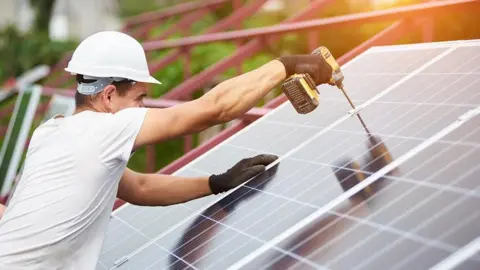Low-carbon heating in Scotland gets £30m fund
 Getty Images
Getty ImagesA £30m fund intended to support low-carbon heating has been opened to applications.
Businesses and organisations working on "innovative" solutions to heating buildings can apply to the Scottish Low Carbon Heat Fund.
Up to 50% of the capital cost of a new project will be available.
The fund is part of wider programme backed by the Scottish government, Scottish Enterprise, and Highlands and Islands Enterprise.
Scotland's energy minister Paul Wheelhouse said: "It's estimated that Scotland's homes are responsible for the emission of six million tonnes of harmful carbon dioxide into our atmosphere every year, 15% of all emissions.
"In order to meet Scotland's ambitious proposed climate change targets, we estimate that nearly every Scottish home - unless already on a renewable heat supply - will need to have a change to its heating system by 2045, if not before.
"The Scottish government is already making inroads to that target, by committing to ensuring that all new homes use renewable or low carbon heat by 2024, but we also want to create an environment where existing homes transition to renewable solutions as well."
'Social benefit'
He added: "By taking this approach we're also supporting jobs, building skills, and ultimately creating end products with an environmental and social benefit."
Citizens Advice Scotland has said the funding should be made available to individuals as well as larger organisations.
Spokesman Dr Jamie Stewart said: "While this investment is focussed on businesses and organisations, it's essential that similar packages are available to those who currently struggle to heat their homes.
"This will ensure that the benefits of renewable heating can be experienced by those who need it most.
"It is vital that the cost of cutting emissions doesn't fall heaviest on the poorest people."
WWF Scotland's climate and energy policy manager Robin Parker added: "In the face of the climate crisis, it's good to see Scottish government support for businesses and organisations to tap into low-carbon heat.
"However, we urgently need to embrace more transformational approaches to decarbonise heat, that rapidly start giving thousands of people every year access to fossil fuel-free heating, with tried-and-tested technologies like heat pumps and district heating.
"That means ambitious changes to building standards, a heat pump sector deal, district heating legislation and an accelerated national energy efficiency programme."
